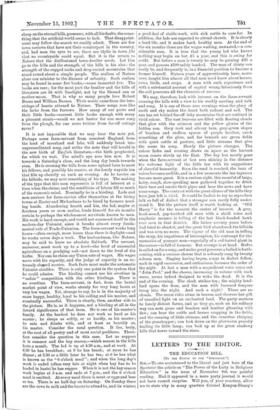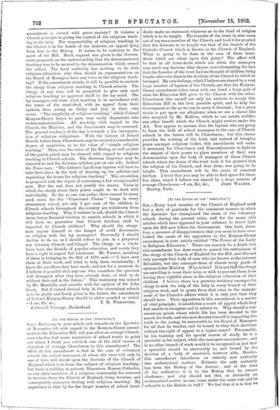LETTERS TO THE EDITOR.
THE EDUCATION BILL.
[TO THE EDITOR OP THE "SPECTATOR.")
Sin,—To one accustomed to the liberal and just tone of the Spectator the article on "The Power of the Laity in Religious Education " in the issue of November 8th was painful reading. Had it appeared in a mere party journal it would not have caused surprise. Will you, of your courtesy, allow me to state why in many quarters Colonel Kenyon-Slaney's
amendment is viewed with grave anxiety ? It violates a Church principle in giving the control of the religious teach- ing to the laity. The responsibility of religious teaching in the Church is in the hands of the minister, an appeal lying from him to the Bishop. It seems to be contrary to the spirit of the Bill. Much support was given to the Govern- ment proposals on the understanding that the denominational teaching was to be secured to the denomination which owned the school. The local authority has nothing to do with religious education ; why then should its representatives on the Board of Managers have any voice in the religious teach- ing ? If the amendment stands, it will be possible to exclude the clergy from religious teaching in Church schools. The clergy, at any rate, will be permitted to give only such religious teaching as approves itself to the lay mind. The lay managers will state what teaching is in accordance with the tenor of the trust-deed, with no appeal from their
opinion, thus acting as Judge and jury in their own cause. " The simplicity of religious teaching," which Colonel Kenyon-Slaney hopes to gain may easily degenerate into undenominationalism. All teaching with regard to the Church, the Ministry, and the Sacraments may be censored. The general tendency of the day is towards a lax interpreta- tion of religious obligations. With the history of School Boards before them, Churchmen may be excused a considerable degree of scepticism as to the value of " simple religious teaching." Then, too, the voice of the Bishop as well as that of the parish priest may be silenced with regard to religious teaching in Church schools. The diocesan inspector may be objected to and the diocesan syllabus put on one side. Indeed the Times says: "The hitherto Laodicean laymen will have to take their share in the task of drawing up the syllabus and regulating the hours for religious teaching." This revolution is proposed with the object of restraining a few wrong-headed men. But the end does not justify the means. Cases in which the clergy abuse their power ought to be dealt with individually. So far as one can judge, there cannot be many such cases, for the " Conscience Clause " hangs in every elementary school, yet only 1 per cent. of the children in Church schools throughout the country are withdrawn from religious teaching. Why, I venture to ask, should the Church incur heavy financial burdens to sustain schools in which it will have no guarantee that Church teaching shall be imparted to Church children ? Why should the clergy- man expose himself to the danger of acrid discussions on religion with the lay managers ? Personally I should decline to do so, as I should refuse to join in a perpetual war between Church and Chapel. The clergy, as a whole, have been the friends of popular education, and surely they have a right to expect fair treatment. Mr. Forster, speaking of them in bringing in the Bill of 1870, said :—" I have seen them at their work, and tried to help them occasionally ; I know the sacrifices they have made, and not for a moment do I believe it possible that any one who considers the question will disregard what they have already done, or wish to do without their aid in the future." This testimony was echoed by Mr. Mundella, and accords with the opinion of Sir John Cont. But if valued clerical help in the elementary schools is to be gladly and freely given in the future, the amendment of Colonel Kenyon-Slaney should be either mended or ended.
—I am, Sir, &c., T. H. WRENFORD. Littleivick Vicarage, Maidenhead.























































 Previous page
Previous page